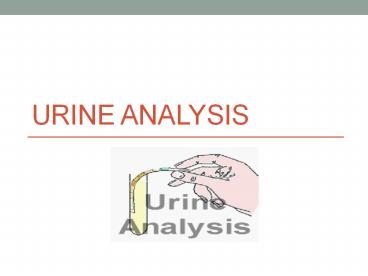Urine%20analysis - PowerPoint PPT Presentation
Title:
Urine%20analysis
Description:
URINE ANALYSIS Macroscopic urinalysis Is the direct visual observation of the urine, noting its volume, color, clarity or cloudiness, etc Normal urine is typically ... – PowerPoint PPT presentation
Number of Views:619
Avg rating:3.0/5.0
Title: Urine%20analysis
1
Urine analysis
2
Macroscopic urinalysis
- Is the direct visual observation of the urine,
noting its volume, color, clarity or cloudiness,
etc - Normal urine is typically pale yellow and clear .
Obvious abnormalities in the color, clarity, and
cloudiness may suggest different diseases.
3
Normal Urine
Abnormal Urine
4
(No Transcript)
5
(No Transcript)
6
Dipstick chemical analysis
- Urine dipstick is a narrow plastic strip which
has several squares of different colors attached
to it. - Each small square represents a component of the
test used to interpret urinalysis. - Colors generated by each pad are visually
compared against a range of colors on
brand-specific color charts - The entire strip is dipped in the urine sample
and color changes in each square are noted.
7
The squares on the dipstick represent the
following components in the urine
Nitrite (suggestive of bacteria in urine)
Bilirubin ( possible liver disease or red blood
cell break down) Urobilinogen ( possible liver
disease)
8
(No Transcript)
9
MICROSCOPIC URINALYSIS
10
MICROSCOPIC URINALYSIS
- Microscopic examination used to view elements
that are not visible without microscope. e.g
cells - 1. Red Blood Cells
- Hematuria is the presence of abnormal numbers of
red cells in urine due to - a. Glomerular damage
- b. Tumors
- c. Urinary tract stones
- d. Upper and lower urinary tract infections
11
Hematuria
- Two Types of Hematuria
- Gross hematuria means that the blood can be seen
by the naked eye. The urine may look pinkish,
brownish, or bright red. - Microscopic hematuria means that the urine is
clear, but blood cells can be seen under a
microscope.
12
(No Transcript)
13
RBC's may appear normally shaped, swollen by
diluted urine.
14
2.White Blood Cells
- Pyuria refers to the presence of abnormal numbers
of leukocytes that may appear with infection in
either the upper or lower urinary tract or with
acute glomerulonephritis. - Usually, the WBC's are granulocytes
- WBCs - 2-5 WBCs/hpf
15
(No Transcript)
16
3. Epithelial Cells
- Renal tubular epithelial cells, contain a large
round or oval nucleus and normally slough into
the urine in small numbers. However, with
nephrotic syndrome and in conditions leading to
tubular degeneration, the number sloughed is
increased. - 15-20 squamous epithelial cells/hpf
17
(No Transcript)
18
4. Casts
- Urinary casts are cylindrical structures produced
by the - kidney and present in the urine in certain
disease states. - They are formed in the distal convoluted tubule
(DCT) and collecting ducts of nephrons, then
dislodge and pass into the urine, where they can
detected by microscopy. - -Urinary casts may be made up of cells (such as
white - blood cells, red blood cells, kidney cells) or
substances - such as protein.
19
(No Transcript)
20
The factors which favor protein cast formation
1. low flow rate of the filtrate 2. high salt
concentration 3. low pH all of which favor
protein denaturation and precipitation,
particularly that of the Tamm-Horsfall
protein. Protein casts with long, thin tails
formed at the junction of Henle's loop and the
distal convoluted tubule are called cylindroids.
Hyaline casts (Tamm-Horsfall proteins) can be
seen even in healthy people.
21
- Hyaline casts are composed primarily of a
mucoprotein (Tamm-Horsfall proteins) secreted by
tubule cells. The Tamm-Horsfall protein secretion
(green dots) is illustrated in the diagram below,
forming a hyaline cast in the collecting duct
22
Red blood cells may stick together and form red
blood cell casts. Such casts are indicative of
glomerulonephritis, with leakage of RBC's from
glomeruli
White blood cell casts may also be present with
glomerulonephritis. Their presence indicates
inflammation of the kidney, because such casts
will not form except in the kidney.
23
(No Transcript)
24
RBCs
Crenated RBC
25
WBCs
26
Hyaline Casts appear Transparent
27
Red Cell Casts
27
28
White Cell Casts
28
29
Bence Jones proteins
Bence Jones proteins are small proteins found in
the urine. Testing for these proteins is done to
diagnose and monitor multiple myeloma and other
similar diseases. Bence Jones proteins are
considered the first tumor marker. A tumor
marker is a substance, made by the body, that is
linked to a certain cancer, or malignancy. Bence
Jones proteins are made by plasma cells, a type
of white blood cell. The presence of these
proteins in a person's urine is associated with a
malignancy of plasma cells.
30
Bence Jones protein cast (myeloma cast) from the
urinary sediment of a patient with lambda-Bence
Jones type multiple myeloma. Sternheimer stein,
X200
31
https//www.youtube.com/watch?vM9Zc4G5EHPA
32
Pregnancy tests
- It detects a hormone in the body called human
choronic gonadotropin (hCG). - hCG is a hormone produced during pregnancy. It
appears in the blood and urine of pregnant women
as early as 10 days after conception - hCG is released into the body by the placenta
when a woman is pregnant.
33
- The urine hCG test is usually performed by
placing - drops of urine on a prepared chemical strip. It
takes 1-2 min. for a result.






























![[PDF] Fundamentals of Urine and Body Fluid Analysis 5th Edition Android PowerPoint PPT Presentation](https://s3.amazonaws.com/images.powershow.com/10078427.th0.jpg?_=20240713106)
